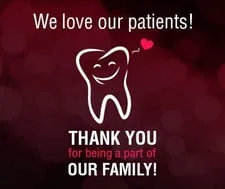 Braces are applied to teeth for various reasons, including poorly aligned jaws, crooked, crowded and missing teeth, or a bad bite (also called malocclusion).
Braces are applied to teeth for various reasons, including poorly aligned jaws, crooked, crowded and missing teeth, or a bad bite (also called malocclusion).
Various things can cause teeth to become crooked or jaws misaligned, including thumb-sucking or a traumatic injury. Some conditions are inherited.
Children between the ages of 7 and 14 are typical candidates for braces because their facial structures are still developing. Adult braces usually entail additional procedures because their faces have already fully developed.
About Braces
Orthodontics is a field of dentistry that deals with corrections involving jaw and teeth alignment.
Braces employ the use of wires and are usually one of three types:
- Old-fashioned, conventional braces, which employ the use of metal strips, or bands.
- Metal or plastic brackets that are cemented or bonded to teeth.
- Brackets that attach to the back teeth (also called lingual braces).
Procedures
Orthodontic procedures, also called orthodontia, are complex processes.
In most cases, a dentist will need to make a plaster cast of the individual's teeth and perform full X-rays of the head and mouth.
After orthodontic appliances are placed, they need to be adjusted from time to time to ensure that they continue to move the teeth into their correct position.
Retainers are used following braces to ensure that teeth remain in position.
Aesthetic and Comfort Issues
Advances in technology have vastly improved appearance issues with orthodontia.
Braces today are made from extremely lightweight and natural-colored materials. The materials that braces attach to-brackets-are bonded to the surfaces of teeth but can be later removed.
People can expect to wear braces for about two years—less or more in some cases. Adults are usually required to wear braces for longer periods of time.
Because orthodontic appliances need to be adjusted from time to time to ensure they continue to move the teeth into their correct position, they can create pressure on the teeth and jaws. This mild discomfort usually subsides following each orthodontia adjustment.
Hygiene issues
People who wear braces must be diligent in ensuring that food particles and other debris do not get trapped in the network of brackets and wires. In addition, brackets can leave stains on enamel if the area surrounding them is not cleaned on a daily basis.
Daily oral hygiene such as brushing, flossing and rinsing are a necessity. Some people with orthodontic appliances can benefit from using water picks, which emit small pressurized bursts of water that can effectively rinse away such debris.
Another caveat: Braces and sticky foods don't mix. Crunchy snacks and chewy substances should be avoided at all costs because they can cause orthodontia to be loosened or damaged.
Space Maintainers
Space maintainers are helpful dental devices that can help teeth grow in normally following premature tooth loss, injury or other problems.
The devices can help ensure that proper spaces are maintained to allow future permanent teeth to erupt.
If your child loses a baby tooth early through decay or injury, his or her other teeth could shift and begin to fill the vacant space. When your child's permanent teeth emerge, there's not enough room for them. The result is crooked or crowded teeth and difficulties with chewing or speaking.





